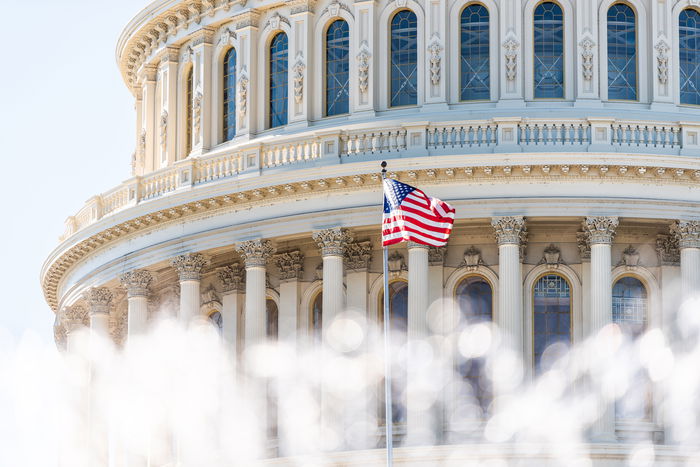

Congress, Stop Ignoring Workforce Development
May 19, 2022
At a Glance
Workforce development has not received the attention it deserves from U.S. policymakers. JFF urges Congress to pass a comprehensive legislative package that will increase U.S. competitiveness and prepare students and workers for the good jobs available now and those coming soon.
Since the onset of the pandemic, Congress has approved billions of dollars in spending to ease this country’s public health and economic crises and also passed a bipartisan infrastructure bill to create hundreds of thousands of new jobs. These investments have been critical to launching a recovery, but something crucial has been missing—a meaningful focus on workforce development.
To date, there has been no significant funding or reform in federal policy to help prepare people for new and high-demand jobs—including people severely harmed by the pandemic. Millions of learners, jobseekers, and current workers urgently need access to high-quality skill development and user-friendly labor market information. It’s the only way to ensure that they will be able to make informed choices about education and training and build the skills and access the supports required to advance in their careers.
JFF urges Congress to pass a comprehensive competitiveness package that will prepare America’s workers for the good jobs already available and those coming soon. These steps are more important than ever as our nation works to recover from the pandemic and remain competitive in the global economy.
Millions of learners, jobseekers, and current workers urgently need access to high-quality skill development and user-friendly labor market information.
The House and Senate are currently working to resolve differences across two competitiveness bills and determine what to include in the final package. Last summer, the Senate passed the United States Innovation and Competitiveness Act of 2021 (USICA) to enact policies that will help our country maintain its strength in the global economy. Earlier this year, the House passed the America Creating Opportunities for Manufacturing, Pre-Eminence in Technology, and Economic Strength Act of 2022 (America COMPETES Act) with the same goal. Both bills invest in research and development, cutting-edge technology, and in-demand industries facing unprecedented labor shortages. The House legislation also includes important education and workforce development provisions that should be included in the final legislative package.
As Congressional leaders work to resolve differences between the two bills, we urge them to preserve the following education and workforce development measures that are necessary to prepare people for current and future job openings, including those created through the competitiveness legislation:
1. Expand Pell Grant eligibility for short-term credential programs.
The House COMPETES Act included a bipartisan amendment that expands Pell Grant eligibility to short-term education and training programs with language modeled after the bipartisan JOBS Act. This expansion would enable today’s students to afford and access more rapid and flexible postsecondary options. The COMPETES amendment also ensures that eligible programs are high-quality and yield strong and equitable outcomes by requiring programs to align with a recognized postsecondary credential, meet employer needs, and articulate for credit to support longer-term career pathways. This provision has extensive support: More than 100 national, state, and local organizations and institutions are backing it.
2. Include key elements of the National Apprenticeship Act.
Apprenticeship has been one of the most successful approaches to cultivating a highly skilled workforce for in-demand occupations. The COMPETES Act contains a slightly revised version of the bipartisan National Apprenticeship Act of 2021, which the House passed in February 2021. This policy would prioritize Registered Apprenticeship opportunities that reach historically underserved populations, including youth and people reentering their community after incarceration. It would also promote apprenticeships in new and emerging industries by creating nearly 1 million additional opportunities over the next five years.
3. Invest in TAACCCT 2.0.
The COMPETES Act also reauthorizes the U.S. Department of Labor’s Trade Adjustment Assistance Community College and Career Training (TAACCCT) grants program. Previously, TAACCCT provided nearly $2 billion to develop effective strategies to improve student success in community college workforce education programs. If approved as part of the final package, TAACCCT 2.0 would facilitate cross-sector partnerships between community colleges and workforce development entities and increase the capacity of public systems to meet employer needs and provide high-quality training options for students.
4. Support college and career pathways approaches in STEM.
Both bills include a Postsecondary STEM Pathways Grant Program that would invest in college in high school programs—such as dual enrollment, concurrent enrollment, and early college high schools—that would encourage more students to enter STEM fields. This program would be an important tool in strengthening our nation’s STEM workforce by helping expose more students to STEM fields, particularly students of color and young women of all backgrounds. Sixty-two other national organizations, state organizations, systems of higher education, and school districts also support this effort.
5. Make postsecondary outcomes data more accessible through the College Transparency Act.
The College Transparency Act (CTA) was added to the COMPETES Act through the same bipartisan amendment as the expansion of short-term Pell eligibility. It would overturn the Higher Education Act’s ban on the collection of student-level data. This would enable students, jobseekers, and workers to obtain accurate data on the quality of postsecondary programs—including information on program affordability and completion rates. The CTA also would contribute to the evidence base for policymaking and strengthen institutions’ efforts to improve their programs and increase postsecondary credential attainment rates. Nearly 150 organizations representing higher education, students, business, workforce development, and civil rights support the CTA’s inclusion in the final competitiveness legislative agreement.
JFF urges policymakers to pass a comprehensive competitiveness package that will prepare America’s workers for the jobs of today and the jobs of the future.
To build and sustain U.S. capacity to compete in the global economy, the bill cannot limit investment to R&D and innovation; it must also support workforce development efforts that ready today’s students, jobseekers, and workers for in-demand career paths and address the nation’s shortages of skilled labor. This is critical to protect American competitiveness and achieve more equitable career outcomes for the American people.
Related Content


JFF Calls on Congress to Increase Investment in and Modernize our Nation’s Workforce Development System
May 18, 2022
Policy at JFF
JFF’s policy team offers fresh ideas on education, poverty alleviation, and workforce issues that prepare students and workers for the jobs of the future and boost our nation's economy. JFF’s policy team offers fresh ideas…